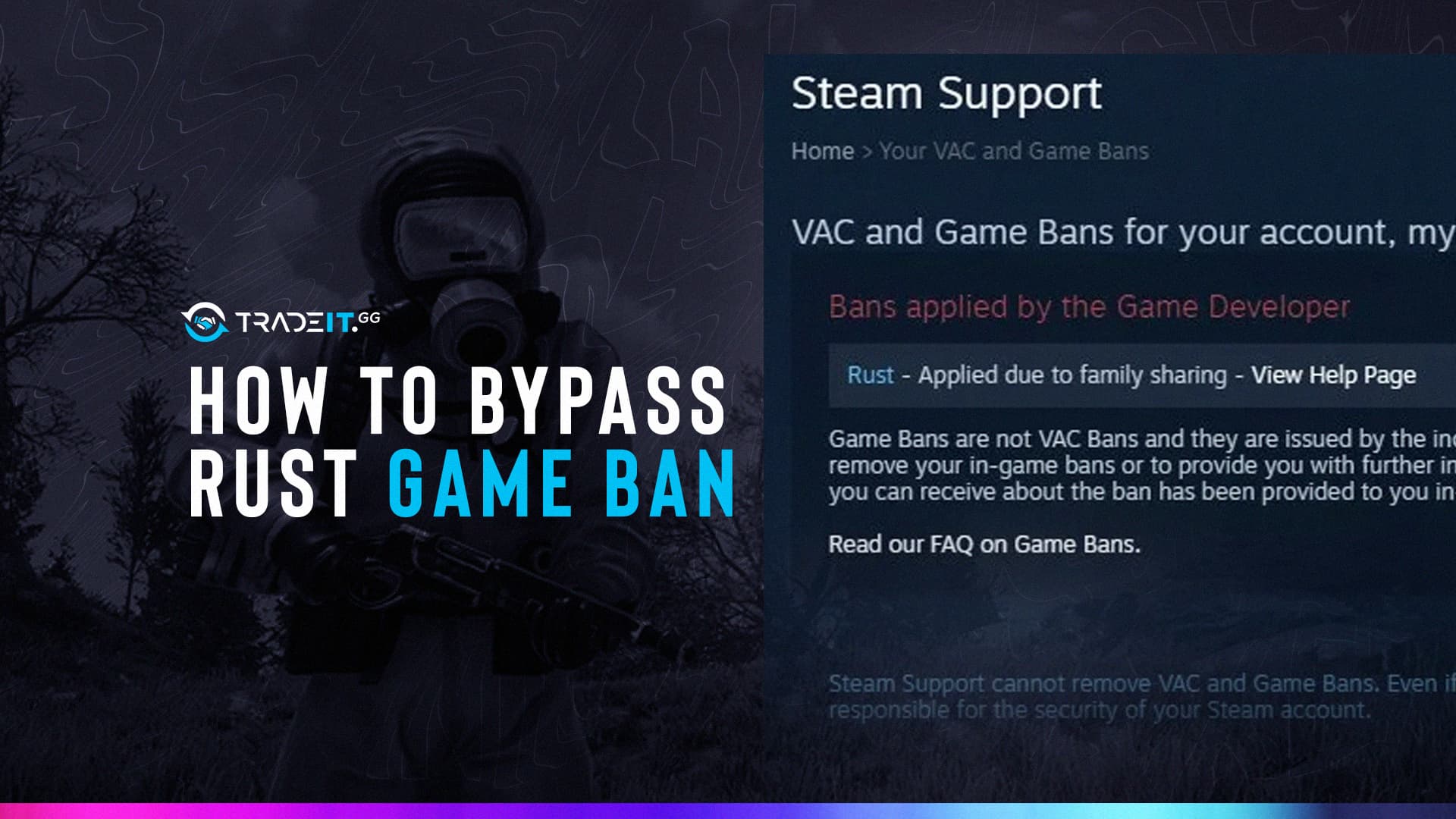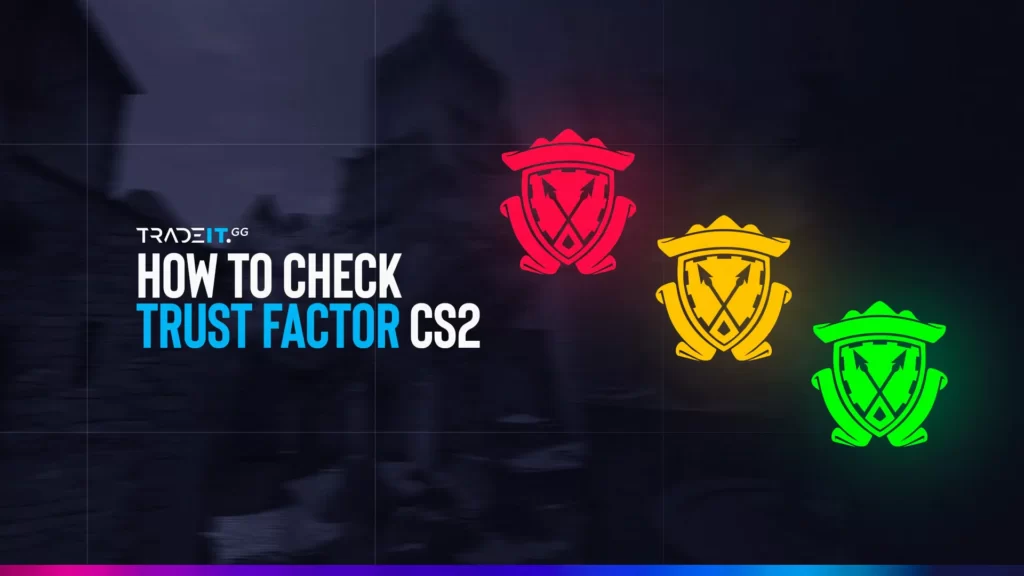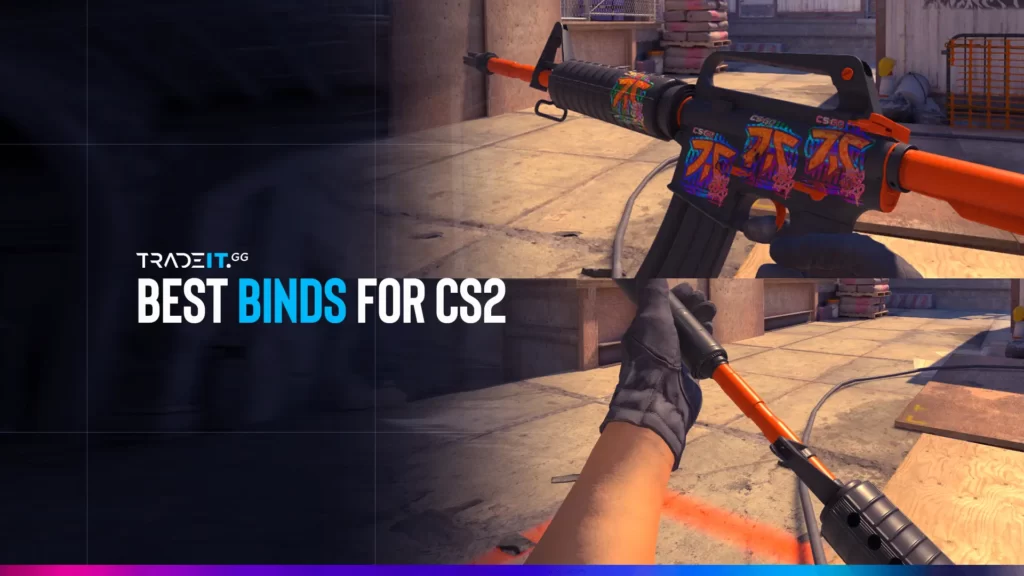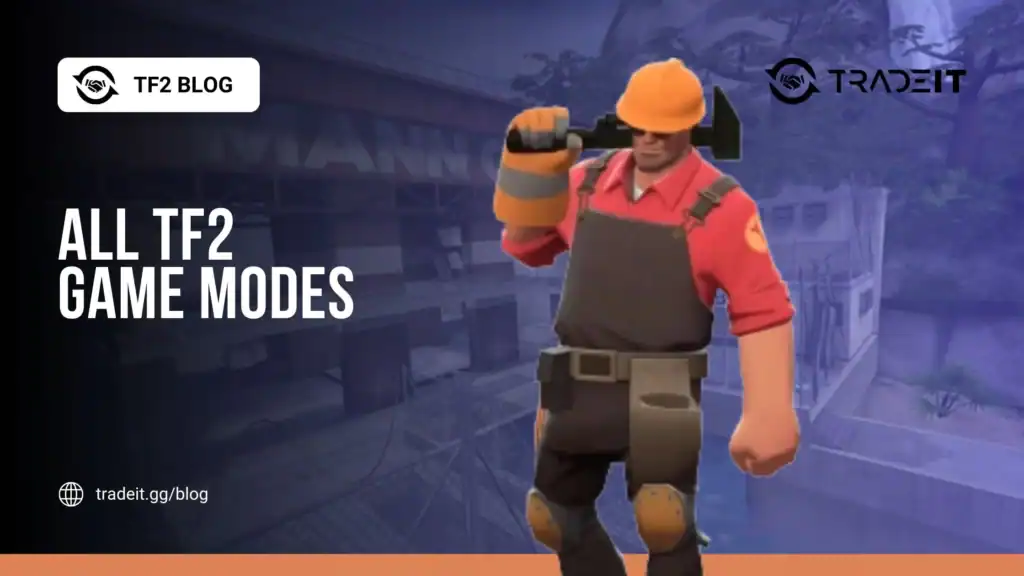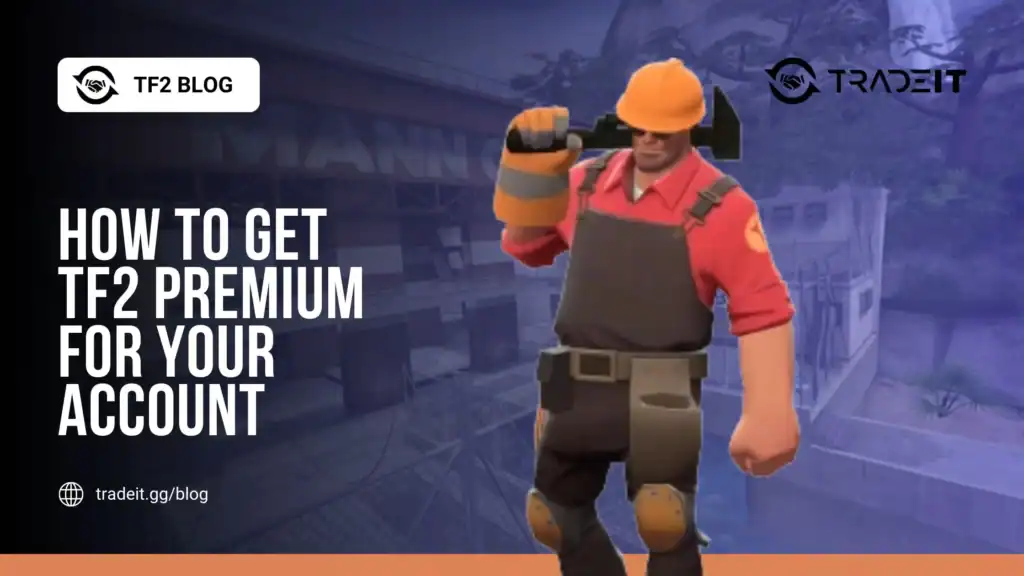Getting banned in Rust is an unpleasant experience. And if you get an HWID ban, that’s even worse. In this article, you’ll learn more about the problem and how you can avoid and bypass the Rust game ban. If you lost access to your inventory, you can always trade Rust skins or start fresh in our Rust item store.
Understanding Rust Game Bans & Why You Get Banned
Rust game bans occur for various reasons, including cheating, toxic behavior, account sharing/buying, griefing, and exploiting glitches. It can be particularly challenging to bypass some Rust game bans, like hardware ID (HWID) bans.
To avoid future bans, it’s crucial to understand why bans are imposed and how to play Rust responsibly. If you believe you were banned unfairly, you can try submitting a Rust developer ban appeal. Keep in mind that Rust has a zero-tolerance policy for cheating and exploiting glitches. It’s always better to play fair and avoid bans in the first place.
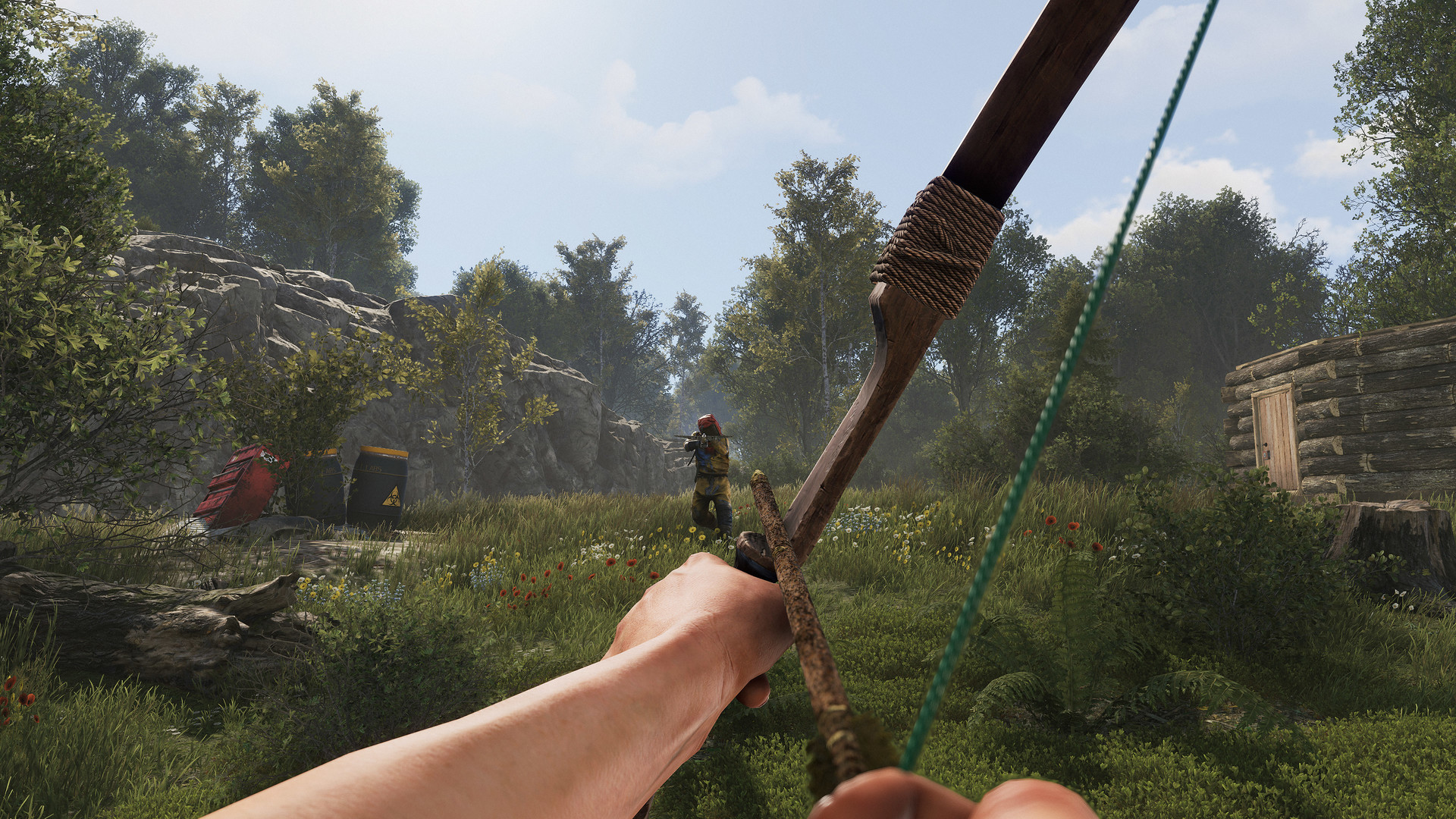
Unless the original ban is lifted, players detected evading a Rust server ban will have their new account(s) in the game banned, this is called a HWID ban.
You will be barred from servers if you have any accounts with a VAC or a game ban in any game (including Rust) that is less than 180 days old. Accounts connected to multiple Rust game bans will have their bans permanently imposed.
Cheating and Hacks
Cheating is a major issue in multiplayer games like Rust. It creates an unfair advantage for the cheater and ruins the gaming experience for everyone else. Cheating is one of the primary causes of bans on Rust’s official servers.
Stay away from unsecured servers to avoid this.
Ban Evasion
If you get banned, instead of appealing it, If you try to evade it and get caught, you will get banned again. And in some situations, you may get an HWID ban. This means that not only your Rust account got banned but your entire PC. So now you’d need to change your PC to play Rust again, which is quite a tough thing to do.
If it ever gets to this point, you might as well regard it as a sign that maybe it’s time to quit the game and do something else. However, if you’re determined to continue playing, you’ll need to buy a new PC. You could also change the key components, such as the CPU, the motherboard, and the GPU, but it’s still risky.
Only by changing the entire configuration can you be sure that you can no longer get caught. And even then, you may need to go a step further and change your Internet provider as well.
Toxic Behavior and Offensive Language
Showing toxic behavior towards other players will result in a ban, especially if you get reported by many different players. Therefore it’s important to understand the reason for the ban and avoid repeating the same behavior in the future.
To prevent bans due to toxicity, players should remain composed and refrain from using communication options in an impolite or malicious manner.
Account Sharing and Buying
Rust account sharing refers to the practice of one user providing access to their game account to another user, or vice versa. However, Steam family sharing for Rust is currently disabled, meaning account sharing is not possible at this time.
If you purchase a Steam account from another player and use it to play Rust, you may be banned. Although this is not one of the common bans,
Griefing
This behavior in Rust involves deliberately disrupting another player’s gaming experience, such as by obstructing access to their base or disposing of their items. Griefing can result in bans and the loss of any in-game skins your account holds. If you’re starting over, here’s how to get Rust skins again safely.
To prevent grief, players should adhere to fair gameplay, report suspicious activity, and respect community standards.
Following these guidelines can help you avoid Rust game bans and ensure a positive gaming experience for all players.
Exploiting glitches
Exploiting glitches in Rust involves using game bugs or glitches to gain an unfair advantage, which is considered cheating. Glitch exploitation can be accomplished through the use of third-party software. For a fairer advantage, focus on skill and performance tweaks like optimizing your Rust PVP settings.
Exploiting glitches can result in a ban from playing the game.
To ensure fair play and uphold the game’s rules and guidelines, players should avoid exploiting glitches in Rust and report any suspected cases of cheating.
Types of Rust Game Bans
There are various types of Rust game bans, including community/modded private bans, game developer bans, Easy Anti-Cheat (EAC) bans, and Valve Anti-Cheat (VAC) bans.
Each type of ban has different implications for a player’s ability to participate in Rust, and understanding these differences can help you navigate the complex world of Rust game bans.
Community / Modded Private Bans
Private servers or groups can ban players who break the rules, like cheating or being mean to others. These bans are not from the official Rust game servers.
You can get unbanned from a community or private Rust game by talking to the people who banned in place. Getting banned from one server usually doesn’t stop you from accessing other servers.
Game Developer Bans
Game Developer Bans, also known as game bans, are issued by Facepunch Studios when there is evidence of cheating or other malicious activity on an account. These bans restrict the user from playing Rust, as well as any other game created by Facepunch Studios, and prohibit access to any of the game’s online services, such as the official forums and support.
Appeals can be submitted either to Easy Anti-Cheat or to Facepunch Studios. Adhering to fair play and respect for fellow gamers, reporting any cheating observed, and complying with community standards can help you avoid game developer Rust game bans.
Easy Anti-Cheat (EAC) Bans
The Easy Anti-Cheat system issues bans to stop players from playing Rust on servers. If you get banned through EAC, your Steam Profile will have a Game Ban.
Rust regularly utilizes HWID Banning to ensure the security of all players. It is crucial to understand the consequences of EAC bans and how they impact your ability to play rugby.
Valve Anti-Cheat (VAC) Bans
Valve’s anti-cheat system gives VAC bans to cheaters in online games. You can’t appeal a VAC ban, but Valve checks for mistakes to make sure it’s correct.
To avoid a VAC ban in Rust, follow the rules of fair play and sportsmanship. Report any cheating and follow community guidelines.
This ban also applies to other games utilizing the VAC system, such as CS:GO—where Valve also uses systems like Trust Factor to control matchmaking.
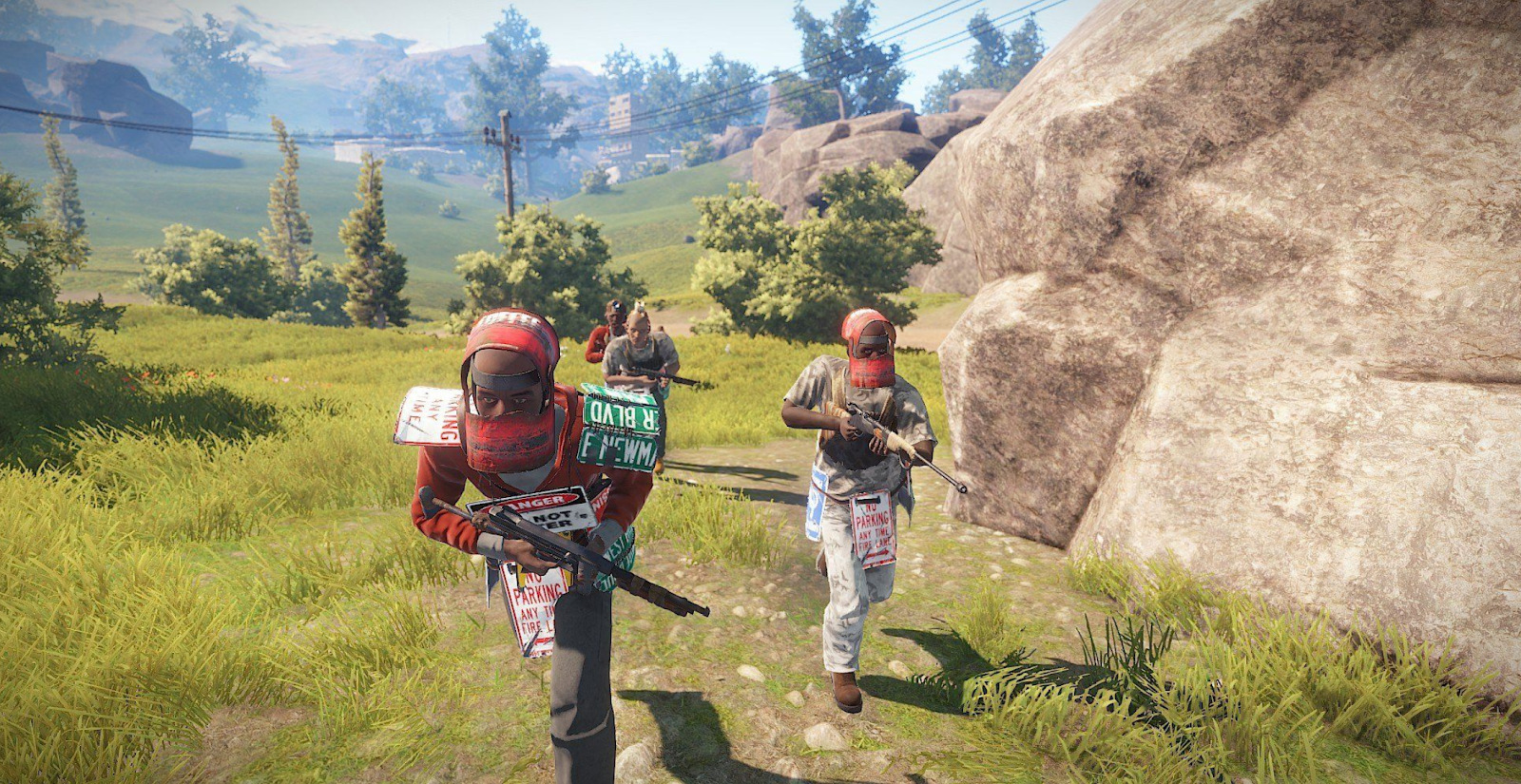
Appealing Rust Game Bans
Appealing bans can be a complex process, depending on the type of ban. If you want to get banned from a privately owned Rust server, you have to use the server’s communication channels. Don’t try to contact game developers; it won’t help.
In this section, we’ll explore the different types of ban appeals and how to navigate the appeal process for each ban type.
Read more about how to appeal Rust game bans.
Community and Modded Server Ban Appeals
You can appeal a ban from a community or a modded server by reaching out to the group that banned you. Depending on the server, there may be a specific process for appealing the ban, or the server may review the ban and determine whether or not to lift it.
Rust Developer Ban Appeals
Rust developer ban appeals provide players with the opportunity to appeal a ban issued by the game developers. You can submit appeals on the Facepunch Studios website, but they may not do anything about it.
EAC Ban Appeals
You can submit a Rust ban appeal through the EAC Support website. When submitting an appeal, it’s important to be concise, articulate, and not excessively demanding.
The current processing time frame for EAC ban appeals is estimated to be between 3 to 14 days, but no response may be received.
VAC Ban Appeals
Officially, VAC bans are final. Appeals are not accepted. However, Valve utilizes a system of checks and balances to review VAC bans and ensure that any accidental bans are accounted for. This system includes manual reviews conducted by the Valve team, as well as automated checks to validate the ban.
How to Bypass a Rust Ban
If you’re determined to bypass a Rust ban, there are some methods you can try. To appeal a Rust EAC ban, you’ll need to complete an authentication process and forms, demonstrate politeness and patience, and allow for a turnaround time of 3-14 days.
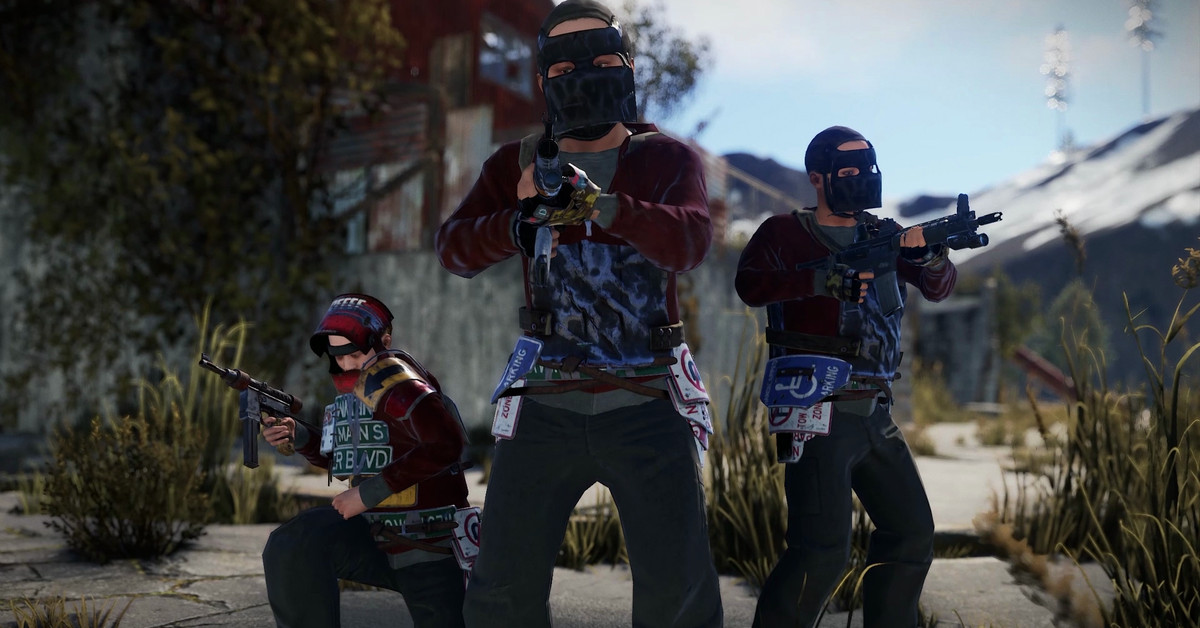
However, there’s no guarantee your appeal will be successful.
Assuming you haven’t been HWID banned for life (or that you don’t suffer from a permanent hardware ID ban), you should try to uninstall Rust and Steam and erase all traces from your PC. That includes registry data.
Another option would be to change your Windows and your hard disk’s serial numbers. However, when you do this, you must also change the HWIDs of everything on your computer and then edit the HWID registry keys. If you’re not a tech person, this will take more than a few seconds, and you might be better off using a HWID spoofer service.
This method is not foolproof and not recommended.
Bypass Issue
One measure that you can take to bypass the issue is to use an HWID spoofer. This is a service that you can buy to play the game undetected. The only issue here is cost-effectiveness.
If your HWID Rust ban is a 24-hour ban, it’s not an issue. And if it’s a 7-day ban, again, it’s not a big issue. But if we’re talking about a permanent ban, which is probably not worth it unless your entire lifestyle is built around the Rust community. Keep in mind that regular Rust force wipes already keep the game fair and balanced for everyone.
If you play Rust all the time and it’s your favorite game, one of them is reading and following the rules. And if you’re rebuilding after a ban, our Rust store offers a safe way to restock your cosmetics.
Frequently Asked Questions
Can you play Rust with a game ban?
If you get banned from the game or the Rustafied servers, you can’t make another account and play again. This is true even if you got banned for using cheats. The moderators have a rule against it and will give you another penalty if they catch you trying to get around the ban.
How to play Rust after a ban?
After a Rust ban has expired, you can continue playing the game as usual, as long as it wasn’t a permanent ban.
What is a 3-day ban in Rust?
A 3-day ban in Rust might indicate that you’ve broken any of the game provider’s policies. You should consider this a warning, as the next ban will be longer or permanent.
How to play Rust after a ban?
To play Rust after a ban, you can try appealing your ban through the appropriate channels, such as the EAC Support website or Facepunch Studios’ website. Alternatively, you can attempt to bypass the ban using methods like HWID spoofers, but this can be risky and expensive.


